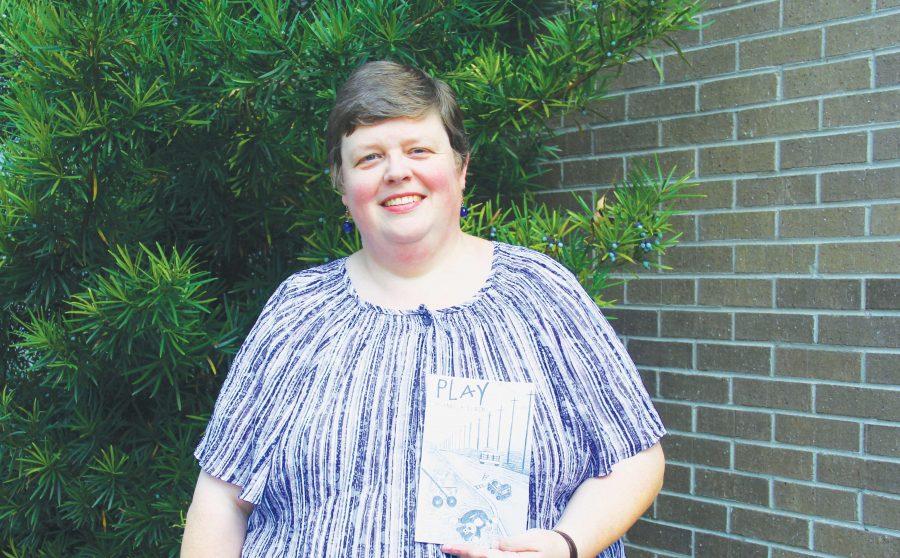Professor Spotlight: Dr. Jo Angela Edwins
Photo by: Christina Xan
Dr. Jo Anglea Edwins recently published a collection of poems titled “Play” which reminisces childhood experiences.
Playing on FMU English professor Dr. Jo Angela Edwins’ infamous use of figurative language, her first poetic chapbook titled “Play” gives her readers a glimpse into the complexities of childhood.
Edwins’ love for poetry began to blossom during childhood. She said that it began with a set of “Childcraft” encyclopedias, which included a volume of children’s poetry.
“I loved that book,” Edwins said. “I read it repeatedly, especially the witty rhymes of the likes of Edward Lear.”
Because of her love for the infinite worlds that literature entails, Edwins said that she found solace in her local public library, a renovated Catholic church.
“I’d go there and check out books of poetry aimed at older readers,” Edwins said. “I didn’t always understand what I was reading, but I adored the sound of the lines.”
Around that same time, Edwins began writing her own poetry, the first poem was titled “Fall Leaves.” After receiving praise for her work from her teachers, Edwins said she used her new-found confidence to send poems to her local newspaper for the childrens’ art and writing section.
“After that, I won several small poem contests, which I suppose were really my first publications,” Edwins said.
However, they were not her last. During her time at FMU, Edwins has published many poetic works in various journals and literary magazines including “Calyx,” “Naugatuch River Review,” “New South” and “Sojourn.”
Edwins was awarded the 2014 Carrie McCray Nickens Fellowship award in poetry from the S.C. Academy of Authors.
Edwins said that this acknowledgement was the recognition that gave her the confidence that she needed to pursue her dream of publishing her collection of poetry, “Play.”
Edwins said “Play” is a window not only into her childhood memories, but of the language and meaning behind the games, phrases and stories that children experience and how they shape people in adulthood.
“For example, take the old parlor game charades,” Edwins said. “Not only is it an interesting thing to observe someone miming an idea, but the name of the game itself – both its sound and meaning – strangely complements what happens in the game. But how often do we stop and think about that?”
Other pieces like “Hopscotch” and “Mrs. Pac- Man” represent Edwins’ own memories as well as express philosophical ideas that she picked up on during the time that she wrote “Play.”
While some of the poems in the chapbook are built on Edwins’ specific memories, she said that she created many of them for theatrical purposes and to make sure readers could relate. Edwins said she believes poetry is meant to be inclusive.
“It can be infuriating to see a poet whose work is not merely difficult but almost impossible to understand unless the poet explains it for you,” Edwins said. “People already see poetry as too pretentious and complicated for them to get anything out of it, so my goal is not to exacerbate that problem in my own works.”
Edwins said that countering many of the stereotypes about poetry has led her to create works that can reach a broad audience. She said she hopes her work goes past the surface and conveys meaning.
“If I can get them to think about something differently, to have feelings or thoughts about the material, then my words have done their job,” Edwins said.
Writers like Marilyn Kallet, author of “The Love that Moves Me,” have written positive reviewis about Edwins’ work.
“Though each of Jo Angela Edwins’ brilliant poems begin ‘in the spirit of slippery fun,’ each takes the reader on a breathtaking, fearless ride to insights about love, mortality, good and evil,” Kallet said. “Whether it’s tag, hide and seek, blind man’s bluff or discarded toys along the interstate, each opens a door for imaginative play and probing. Each poem is a door to the marvelous. The cumulative impact of ‘Play’ is dazzling – offering a surprising collection worthy of our nation’s top literary prizes.”
“Play” can be found on the Finishing Line Press website for $14 and soon on Amazon.com.
